Miami University’s John W. Altman Institute for Entrepreneurship is among the best in the nation, according to the Princeton Review and Entrepreneur magazine’s 2020 list of the top 50 Best Undergraduate Programs for Entrepreneurs.
The program is ranked fifth among public undergraduate colleges and 11th among all undergraduate schools. This marks the 12th consecutive year the program has been listed in the top 10 among U.S public undergraduate programs.
Data was collected from more than 300 schools offering courses in entrepreneurship, according to the Princeton Review’s press release.
“This department is filled with passionate professors who challenge you in ways you didn’t know possible,” said sophomore Anna Lehr, a marketing major who took entrepreneurship for the Farmer School of Business’s core curriculum.
The program offers a co-major, minor, and certificate program while engaging more than 4,300 full-time equivalent students from every major on campus.
A popular choice
Entrepreneurship has quickly become a popular choice among Miami students, with the number of students quadrupling over the last four years, according to institute director Tim Holcomb.
“This past year was the first year we had at least one student from every major across campus,” said Holcomb.
Students are provided with ample opportunities to gain hands on experience in the field through co-curricular student programs.
Among the most notable include the RedHawk Venture Pitch Competition, in which students pitch startup ideas to private investors and venture capitalists. In the 2018-2019 academic year, 128 investors from 12 different states across the nation participated in the competition. Seven startups that have competed have even raised more than $12 million in venture funding.
Miami’s Techstars® Startup Weekend is also one of the most successful events for the program. Sponsored by Techstars®, the largest accelerator network in the world, this 48-hour event allows students to pitch ideas for new startup companies. Miami remains the only university in the nation to incorporate Startup Weekend into its curriculum.
The program takes a hands-on approach to the education of its students, encouraging them to “look at change as opportunity not as problems,” said David Eyman, the Farmer School of Business’ director of innovation.
“We teach them to think for themselves,” Eyman said.
The program recruits their students, searching for those who will contribute to the successful reputation of the program.
“We look for students who don’t know everything,” said Eyman. “They’re not in here to get a grade, they’re in here to learn something and to make something happen in the world.”
A significant number of graduates hailing from Miami’s program have done just that.
“In the last decade we’ve had roughly 600 alum that started about 150 funded startups and those companies have raised almost $6.1 billion including companies like Uber, Twitter, Instagram, GoHealth Insurance, and Credit Karma,” said Holcomb.
Some students have gone on to take up significant leadership positions within these companies, like Ryan Graves (’06), the first CEO of Uber; Nichole Mustard (’95), a co-founder of Credit Karma; and Brian Niccol (’96), the current CEO of Chipotle.
Student success
Despite entrepreneurship’s connotation, the faculty do not have any expectations for students to start their own companies. “Our goal is to expose students to the startup and entrepreneurial environment,” said Holcomb.
They do this through their co-curricular programs, like Techstars® and Startup Weekend, while also inviting alumni and business professors to Miami to connect with students.
Student success is the main desire of the faculty in the program, with each professor taking a personal interest in their students’ goals.
“Our faculty pay attention to students outside of the classroom at a level that I’ve not seen, being at Texas A&M University and Florida State University, two other very successful universities. I’ve never seen a faculty that engage with students at the level they do here,” said Holcomb.
Students hold the same admiration for their professors, engaging with them not only on an academic level, but a personal one as well.
“Versus other departments, this department is so personal and they push you to your limits to succeed,” said Jenna Walter, a sophomore interactive media studies major and entrepreneurship co-major, who hopes to one day start her own business. “You form real relationships with your professors.”
What’s next?
The institute has many plans for its program’s future, including a potential plan for a new building for entrepreneurship, innovation, and technology.
Miami president Greg Crawford also has said he hopes to see every student at Miami taking at least one entrepreneurship course in the future, according to Holcomb.
Crawford expressed that in July 2017, when speaking before the U.S. House Committee on Small Business: “The entrepreneurial spirit and philosophy at Miami is embedded in every major – not limited to the business school or science, technology, engineering and math (STEM) disciplines. In fact, more than half of our students in entrepreneurial activities at Miami are outside the business school. All our students have rich opportunities to sharpen their entrepreneurial mindset.”
As more students have chosen entrepreneurship as their course of study, Miami continues to foster their growth and ensure their success “one person at a time,” said Holcomb. “We like to say we prepare our graduates to be entrepreneurial leaders and be job ready day one.”








